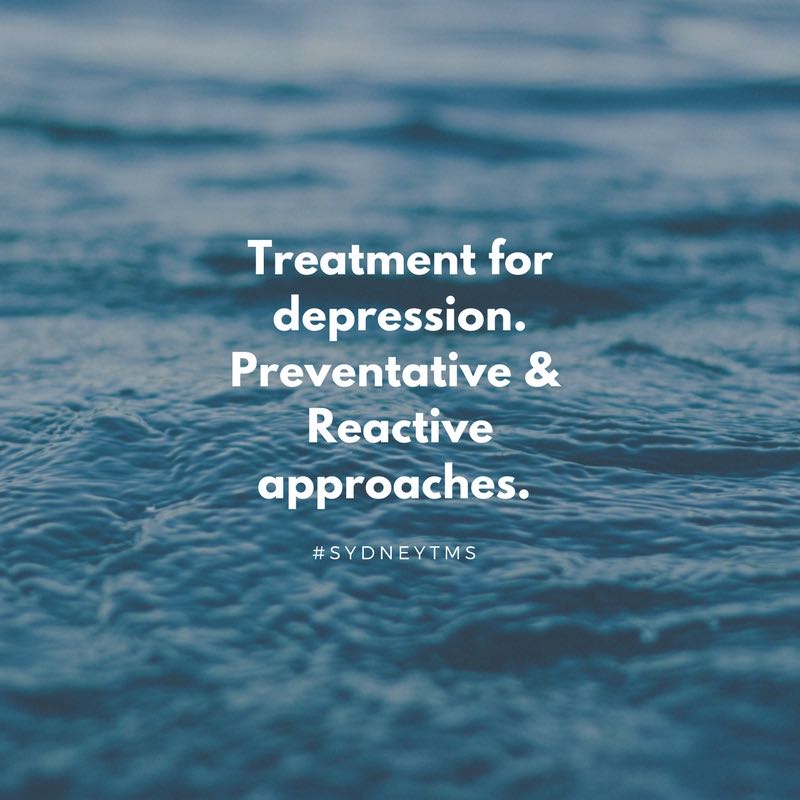Depression Treatments
If you are someone who’s been experiencing depression or depressive symptoms for a long time, depression treatment options that are available might become a bit confusing or overwhelming. This blog post is designed to give you a brief yet concise overview of what’s available in Australia. Please remember that this information shouldn’t be taken as personalised or formal advice for yourself. We recommend starting with your GP and discussing your concerns first.
Before we begin, let’s take a look at what Mental Health Professionals exist in Australia and what depression treatments they provide:
GP
A general practitioner is the first point of contact for all medical and mental health concerns for Australians. A GP can diagnose a mental illness and provide medication-based interventions. Furthermore, they can discuss depression treatments with you and also coordinate your care and rule out medical conditions (1).
Psychologist
A registered or clinical psychologist can provide assessment, diagnosis, and treatment of mental health disorders. Remember that your GP can organise a referral for you. Also, with a mental health plan you will be able to access rebates available through Medicare (2).
Psychiatrist
A psychiatrist is a medical doctor specialised in the diagnosis and treatment of mental health disorders. Psychiatrists most commonly have expertise in prescribing medications, however, some may offer psychological therapy. In addition, they can make formal diagnoses of mental health and developmental disorders (3).
Mental Health Nurse Practitioner
Although a fairly recent profession, nurse practitioners are registered nurses with an advanced university education who specialise in mental health. They can assess, diagnose, treat, provide therapy, and prescribe medication within their specialty (4).
Counsellors and Psychotherapists
Counsellors are mental health professionals trained to assist clients to navigate difficult times and can provide therapy. Psychotherapists generally are similar to counsellors but tend to have more extensive clinical training, and focus more on treating diagnosed mental health disorders (5).
The professionals above may also recommend a particular type of depression treatment. Here is a breakdown of current treatment options:
Psychological Therapy
Psychological therapy would be considered a first-line form of mental health treatment. With a Mental Health Care Plan from a General Practitioner, you can access rebates for 10 sessions with a psychologist per year. Seeing a psychologist is a great first step for addressing mental health problems where first-line treatment from a GP might not be enough. A psychologist can diagnose you with a mental health disorder and then make a plan to treat it with a therapeutic approach. They also may refer you to other professionals for additional support. Many of the above professionals can offer these types of therapies, like Psychologists, counsellors, and psychotherapists to name a few. Currently, only psychologists have Medicare rebates for this.
Types of therapy a Psychologist might provide:
CBT
Cognitive Behavioural Therapy aims to change negative thought and behaviour patterns.
IPT
Interpersonal Therapy aims to improve interpersonal relationships and communication.
Psychodynamic Therapy
Explores unconscious processes and past experiences.
DBT
Dialectical Behaviour Therapy aims to teach skills for emotional regulation, mindfulness, and interpersonal effectiveness to improve mental health (6).
Medication Treatments
In Australia, GPs, Psychiatrists, and Mental Health Nurse Practitioners can prescribe medication to treat depression. Medication could be considered a first or second-line treatment for depression. Psychologists, Psychotherapists, and Counsellors cannot prescribe medication at this stage. Prescribers of these medications might trial you on a few different medications, combinations of medications, and even combining mood-stabilising medications and/or antipsychotic medications with an antidepressant. Some of the types of antidepressant medication used to treat depression include:
SSRI
Selective Serotonin Reuptake Inhibitors are fairly common first-line medications, which aim to increase levels of Serotonin in the brain, a neurotransmitter that plays a role in mood and emotions.
SNRI
Serotonin and Norepinephrine Reuptake Inhibitors aim to increase both serotonin and norepinephrine in the brain to enhance mood and energy.
TCA
Tricyclic Antidepressants work similarly to SNRIs but can have more side effects than newer medications.
MAOIs
Monoamine Oxidase Inhibitors prevent the breakdown of mood-regulating chemicals to improve mood.
Atypical Antidepressants
These medications work differently from the above and have unique ways of working. These might include Bupropion, Mirtazapine, and Vortioxetine (7).
To read more about new medication depression treatments please CLICK HERE
Beyond Medications and Therapy
Once someone has tried a good amount of psychological therapy, a varied array of antidepressant medications, and even holistic treatment addressing lifestyle factors or medical conditions, it could be reasonable to look at what else there is. We would consider these to be second or third-line treatments for treatment-resistant depression or treatments for more acute and life-threatening depression.
Hospital Admission
A hospital admission involves staying in an inpatient mental health clinic to receive more intensive and specialist treatment. Hospitalisation might be done when there’s an acute risk to someone’s safety, someone’s symptoms are particularly severe and require close monitoring and intensive treatment, or situations where rapid intervention is needed. It might also involve more intensive treatment like ECT or intensive therapy (8).
Transcranial Magnetic Stimulation:
TMS is a noninvasive procedure for treatment-resistant depression. It involves placing a strong electromagnet over a specific part of the brain to influence brain activity. In people who have tried 2 or more antidepressants, TMS has about a 60% response rate. TMS is what we provide here at Sydney TMS on an outpatient basis. TMS could be considered a second or third-line treatment (9). For more information on TMS and how Sydney TMS can help please visit our website further and this page in particular is TMS for me?
Ketamine Therapy
Ketamine therapy involves receiving doses of ketamine, most commonly via an intravenous infusion or nasal spray, to treat acute or chronic depression. However it’s important to know that research is still ongoing (10).
Electroconvulsive Therapy
ECT or electroconvulsive therapy is used for acute or severe depression, and often acute depression with suicidal ideation. It involves running an electrical current through the frontal lobe of the brain to induce a seizure which leads to a therapeutic outcome, and is generally accepted to be over 70% effective. These days, it’s nothing like what is depicted in old movies, and is generally considered safe and effective but can be fairly invasive as it involves general anaesthesia and can cause issues with memory in some people, though rare. ECT would be considered more of a third-line or higher form of treatment (11).
Other depression treatments
Some more experimental ideas or therapies in their early stage of research include Psilocybin (Mushroom) based therapy, MDMA Assisted therapy, magnetic seizure therapy, deep brain stimulation, and faecal transplant procedures. These would generally be considered new, in research or fairly experimental and may be hard to access.
Hopefully, this article has provided a comprehensive overview of what options there are for depression treatments in Australia, what they mean, why they’re done, and what kind of professionals are involved in mental health.
References
1. Australia H. Talking to your doctor (GP) about mental health [Internet]. Healthdirect Australia. 2023 [cited 2024 Feb 20]. Available from: https://www.healthdirect.gov.au/talking-to-your-doctor-gp-about-mental-health
2. Better Health Channel. Psychologist [Internet]. Better Health Channel. [cited 2024 Feb 20]. Available from: https://www.betterhealth.vic.gov.au/health/serviceprofiles/psychologist-service
3. RANZCP. What’s a psychiatrist? [Internet]. RANZCP. 2021 [cited 2024 Feb 20]. Available from: https://www.yourhealthinmind.org/psychiatry-explained/whats-a-psychiatrist
4. Butt A. About – NPathy – Mental Health Nurse Practitioner [Internet]. NPathy. 2022 [cited 2024 Feb 20]. Available from: https://npathy.com.au/about-nurse-practitioner/
5. Australia Counselling. What is the difference between counselling and psychotherapy? [Internet]. Australia Counselling. 2013 [cited 2024 Feb 20]. Available from: https://www.australiacounselling.com.au/whats-difference-between-counselling-and-psychotherapy/
6. RANZCP. Psychological treatments [Internet]. RANZCP. 2016 [cited 2024 Feb 20]. Available from: https://www.yourhealthinmind.org/treatments-medication/psychological-treatments
7. Australia H. Antidepressant medicines [Internet]. healthdirect. 2023 [cited 2024 Feb 20]. Available from: https://www.healthdirect.gov.au/antidepressants
8. RANZCP. Psychiatric hospitals [Internet]. RANZCP. 2019 [cited 2024 Feb 20]. Available from: https://www.yourhealthinmind.org/treatments-medication/psychiatric-hospitals
9. Mayo Clinic. Transcranial magnetic stimulation [Internet]. Mayo Clinic. 2023 [cited 2024 Feb 20]. Available from: https://www.mayoclinic.org/tests-procedures/transcranial-magnetic-stimulation/about/pac-20384625
10. Alcohol and Drug Foundation. Can ketamine help treat depression? [Internet]. Alcohol and Drug Foundation. 2023 [cited 2024 Feb 20]. Available from: https://adf.org.au/insights/ketamine-treat-depression/
11. psychiatry.org. What is Electroconvulsive Therapy (ECT)? [Internet]. psychiatry.org. 2023 [cited 2024 Feb 20]. Available from: https://www.psychiatry.org/patients-families/ect


